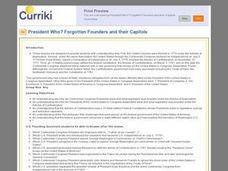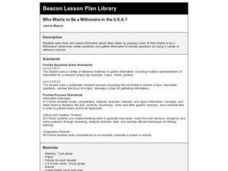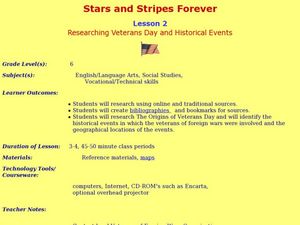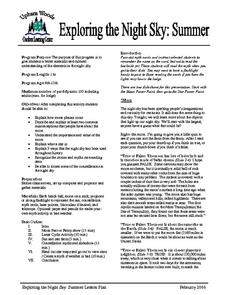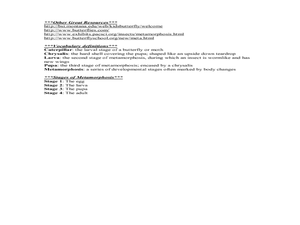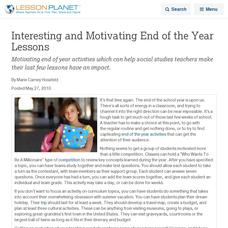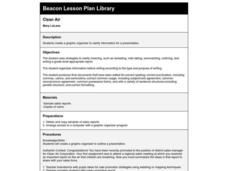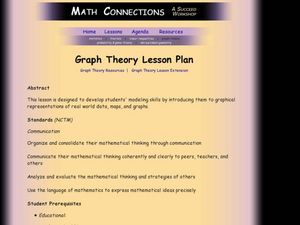Curated OER
Rainforests
Second graders explain the characteristics of a rainforest habitat. For this rainforest lesson, 2nd graders examine the layers of the rainforest and the locations of rainforests. Students complete a scavenger hunt on an assigned layer...
Curated OER
President Who? Forgotten Founders and Their Capitols
Young scholars explore the beginning of the United Colonies that were formed in 1774. In this history lesson, students discuss the Articles of Confederation and then answer questions about the events surrounding the development of the...
Curated OER
Who Wants to Be a Millionaire in the U.S.A.?
Students research the states, gathering information and creating questions and answers. They play a form of Who Wants to be a Millionaire? using the student-generated questions and answers.
Curated OER
Christopher Columbus, The Explorer
Students brainstorm important facts about Christopher Columbus, input information into Kidspiration or Inspiration, watch United Streaming Video on Christopher Columbus and New World to gather information, research online to find...
Curated OER
Avalanche And Landslide Hazards in Canada
Students explore where the natural disasters, avalanche and landslides, are most frequent in Canada and investigate their associated causes and effects. They navigate the Atlas of Canada Web site for natural hazards.
Curated OER
How Many Animals?
Learners use their math skills to develop estimates for the population of several animal species native to the Austrailian rainforest. It is a simulation that researchers at the Center for Rainforest Studies in Australia perform to...
Curated OER
Ghost in Your Genes
Students explore DNA microarrays. In this genetics lesson plan, students model DNA microarrays that are used by scientists. Students work to determine levels of breast cancer genes in patients. They will determine the treatment required...
Curated OER
Stars and Stripes Forever: Researching Veteran's Day and Historical Events
Sixth graders research Veteran's Day and wars that affected the United States. In this research lesson plan, 6th graders work in small groups to create an oral presentation based on Internet and conventional research. They complete...
Curated OER
Readers Who Struggle Can Learn From Wonderful Teacher/Student Created On-Level Reading Projects
Learners create their own books. In this book making lesson, students pick a subject and take photographs of it. They use these photographs to write their own story using their sight words.
Curated OER
International Festival: Venezuela
Students become familiar with the Venezuelan culture and geography. In this Venezuelan Festival lesson, students compare and contrast themselves to the people of Venezuela. Students participate in activities to understand the culture...
Curated OER
Using Primary Sources to Discover Reconstruction
Fifth graders discover how reconstruction had an impact on racial issues in the United States. In this Reconstruction lesson, 5th graders are introduced to primary vs. secondary resources and then rotate through stations to view...
Curated OER
Russia's Conversion From Communism to Capitalism
Learners study Russia's conversion from a communist nation to a capitalist nation.
Curated OER
Exploring the Night Sky: Summer
Students explain how moon phases occur. They describe and explain at least two common misconceptions that people have about the moon. Students explain what a star is. They explain 3 ways that the night sky has been used throughout history.
Curated OER
Genome: A Tour and Genetic Disorder Brochure
Students use the Internet to gather information about genetics, then research a genetic disorder. For this biology lesson, students listen to an interview with a geneticist, watch an animation of "chromosome coiling", then research and...
Think Map
Know Your Polygons!
Shape shifters recognize characteristics of polygons. Embracing language arts skills in addition to math, they use a thesaurus to pinpoint specific attributes of a set of polygons. They also participate in a 21-question guessing game...
Curated OER
Life Cycle of the Monarch Butterfly
Third graders access prior knowledge of the monarch butterfly and discuss what they would like to know. In this Monarch Butterfly lesson,students read Monarch Butterfly and discuss the life cycle of the butterfly. Students gather...
Curated OER
Writing Worksheets Can Help Students Organize Their Thoughts
Teachers can help their students organize their ideas with the use of writing worksheets.
Curated OER
Interesting and Motivating End of the Year Lessons
Motivating end of year activities which can help social studies teachers make their last few lessons have an impact.
Curated OER
Clean Air
High schoolers read sales promotion reports and create a sales promotion summary using information from the report. They develop a graphic organizer to outline their information for a presentation. There is an assessment checklist...
Curated OER
Forest Habitats
In this identification lesson, 3rd graders view photographs of different kinds of forests, learn where forests are located, and discuss seasonal changes in forests. Students read Look What I Did With a Leaf, collect leaves, identify what...
Curated OER
Distinguishing Between Levels of Government
Twelfth graders study confederal, federal, and unitary governments. They compose an essay that compares and contrasts the purpose of state/local government with that of the national government in the American federal system.
Curated OER
European Climates
Ninth graders study the climate regions of Europe. In this geography skills lesson plan, 9th graders determine how weather and climate are influenced as they research the climate zones of specific locations and write about the ways that...
Curated OER
Graph Theory
Students explore the concept of graph theory. In this graph theory instructional activity, students participate in hands-on activities that enforce graph theory. Students manipulate graph applets on the internet. Students create a...
Curated OER
Living in a Watershed
Fourth graders examine watersheds. In this ecosystem lesson, 4th graders discover what a watershed is and identify the local watershed they live in. Students investigate the attributes of a watershed as well.



